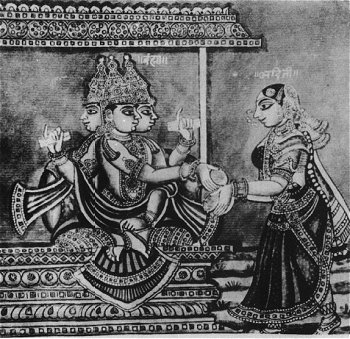|
Payovrata
According to ''Bhāgavata Purāṇa'', Payovrata is the ''vrata'' ("penance") observed by goddess Aditi (अदिति) to propitiate Lord Vishnu. Ritual It is usually observed for 12 days, and during that time the devotee subsists on a diet of milk alone. Mythology A notable event is that of Sage Kashyapa who asked his wife, Aditi, to use this method to please Vishnu (Narayana) so that a solution could be found for her son who was defeated by the Asuras. This penance finally resulted in Vamana sending Mahabali Mahabali (IAST: Mahābalī), also known as Bali, Indrasenan, or Māveli, is a daitya king featured in Hinduism. He is the grandson of Prahlada, and a descendant of the sage Kashyapa. There are many versions of his legend, in ancient texts such ... to the netherworld. References {{DISPLAYTITLE:''Payovrata'' Vaishnavism Vrata ... [...More Info...] [...Related Items...] OR: [Wikipedia] [Google] [Baidu] |
Aditi
Aditi (Sanskrit: अदिति, lit. 'boundless' or 'limitless' or 'innocence') is an important Vedic goddess in Hinduism. She is the personification of the sprawling infinite and vast cosmos. She is the goddess of motherhood, consciousness, unconsciousness, the past, the future, and fertility. She is the mother of the celestial deities known as the adityas, and is referred to as the mother of many deities. As celestial mother of numerous beings, the synthesis of all things, she is associated with space (''akasha'') and with mystic speech (''Vāc''). She may be seen as a feminine form of Brahma, and associated with the primal substance (''mulaprakriti'') in the Vedanta. She is mentioned more than 250 times in the ''Rigveda,'' the verses replete with her praise. Family Aditi is the daughter of Daksha and Asikni (Panchajani). The ''Puranas'', such as the ''Shiva Purana'' and the ''Bhagavata Purana'', suggest that Daksha married all of his daughters off to different people ... [...More Info...] [...Related Items...] OR: [Wikipedia] [Google] [Baidu] |
Vamana
Vamana (), also known as Trivikrama (), Urukrama (), Upendra (), Dadhivamana (), and Balibandhana () is an avatar of the Hindu deity Vishnu. He is the fifth avatar of Vishnu, and the first Dashavatara in the Treta Yuga, after Narasimha. Originating in the Vedas, Vamana is most commonly associated in the Hindu epics and Puranas with the legend of taking back the three worlds (collectively referred to as the ''Trailokya'') from the daitya-king Bali by taking three steps to restore the cosmic order. He is the youngest among the adityas, the sons of Aditi and the sage Kashyapa. Nomenclature and etymology 'Vāmana' (Sanskrit वामन) means 'dwarf', 'small' or 'small or short in stature'. It also means 'dwarfish bull', which is notable as Vishnu is directly associated with dwarfish animals (including bulls) in the Vedas (see below). Stated in Puranic literature to be born of the great sage Kashyapa and his wife Aditi, other names or epithets referring to Vamana include: ... [...More Info...] [...Related Items...] OR: [Wikipedia] [Google] [Baidu] |
Lord Brahma And Adhiti - 19th Century Illustration
Lord is an appellation for a person or deity who has authority, control, or power over others, acting as a master, chief, or ruler. The appellation can also denote certain persons who hold a title of the peerage in the United Kingdom, or are entitled to courtesy titles. The collective "Lords" can refer to a group or body of peers. Etymology According to the Oxford Dictionary of English, the etymology of the word can be traced back to the Old English word ''hlāford'' which originated from ''hlāfweard'' meaning "loaf-ward" or "bread-keeper", reflecting the Germanic tribal custom of a chieftain providing food for his followers. The appellation "lord" is primarily applied to men, while for women the appellation "lady" is used. This is no longer universal: the Lord of Mann, a title previously held by the Queen of the United Kingdom, and female Lords Mayor are examples of women who are styled as "Lord". Historical usage Feudalism Under the feudal system, "lord" had a wide ... [...More Info...] [...Related Items...] OR: [Wikipedia] [Google] [Baidu] |


